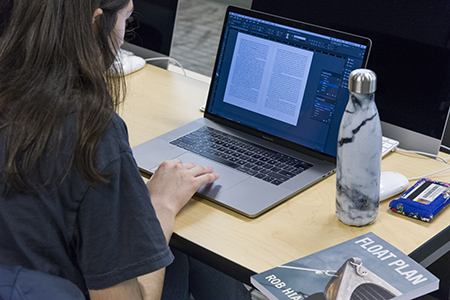Apprentice House Press offers real-world experience in publishing industry
Loyola's student-run book publisher offers opportunities to students
George P. Matysek, Jr., ’94
Karl Dehmelt, ’18, already had a 100,000-word novel well underway when he landed at Loyola University Maryland as a freshman in 2014.
A fictionalized account of events surrounding the trauma and loss his family endured during his mother’s battle with terminal cancer, the manuscript had consumed more than a year of the young Pennsylvanian’s life.
“I knew I had a story that I could try to run with,” remembered Dehmelt, a writing major who now teaches English in Spain. “I was hoping to get it published, but I was just 18 and didn’t know anything about publishers.”
After typing “Baltimore-area publishers” into a Google search, Dehmelt was stunned to discover Loyola itself was home to Apprentice House Press, the nation’s first book publisher that is entirely student-managed.
“I literally went running down to the communication department trying to find it,” Dehmelt said with a laugh.
Learning that the next deadline for submitting manuscripts was just three weeks away, the ambitious freshman shifted into high gear.
“I just maniacally worked on the manuscript as I was taking my classes that first semester,” said Dehmelt. He also received suggestions for strengthening his story from Loyola’s Writing Center.
“I did a bunch of revisions, cut 21,000 words, and took the book from the past tense into the present,” he said. “Then I submitted it.”
The novel was accepted by fellow Loyola students who reviewed it along with dozens of other submissions in a manuscript acquisitions class affiliated with Apprentice House.
Loyola students in separate classes shepherded Dehmelt’s manuscript through every stage of production—working with the debut author on the cover, page layout, and design. After the publication of The Hard Way to Heaven in 2015, students also coordinated marketing and promotion with Dehmelt.
“The cool thing about Apprentice House is that they give authors a good amount of creative control,” Dehmelt said. “I think it was good to have people of different ages working on it to see what appeals to different demographics.”
As its name makes clear, Apprentice House focuses on helping students interested in the publishing industry learn from professionals while doing hands-on work that culminates in the production of tangible books.
Kevin Atticks, ’97, DCD, Apprentice House’s director, said works are published through student efforts in three classes: manuscript evaluation and development, book design and promotion, and book marketing and promotion.

“The classes are set up like an office space,” said Atticks, who teaches all three courses.
There are some lectures, but, in general, we are engaging each student individually about the projects, and then we have a lot of workshops. There’s a lot of mentorship.
Apprentice House has its origins in a book publishing class taught by Barbara Holdridge, a former adjunct professor and pioneer in audiobooks, beginning in 1987. Students produced seasonal catalogues with book titles that reflected their own interests.
The course evolved under Andrew Ciofalo, a communication professor who worked with students to develop mock Apprentice House books.
As improvements in technology made book production more accessible, Apprentice House took its current form in the mid-2000s, with students overseeing the production of actual books through the various publishing courses.
Apprentice House has published more than 120 titles, with multiple formats of each. The top three sellers are Hale Storm, a biography of Baltimore businessman Ed Hale by former Baltimore Sun columnist Kevin Cowherd; Flashes of War, a collection of short stories about the human faces of war by award-winning writer Katey Schultz; and Float Plan, a novel by Rob Hiaasen, a journalist at the Capital Gazette in Annapolis who was slain last year by a gunman in his publication’s newsroom.

“One of the highlights for students working at Apprentice House is that they get to take manuscripts based not on how many books they think they will sell,” Atticks said, “but on books they are excited about. We are one of the few presses I know of that is omni-genre. We love fiction and memoirs, and we have an affinity for poetry. We’ll take it if we love it.”
Sales of published books “more than cover” the activities and costs that go into the production of the books, Atticks said. Apprentice House uses the additional revenue for competition entries and complimentary review copies.
The communications professor noted that many Apprentice House books have earned reviews and commendations, with five winning national awards. Like any venture, though, this one comes with its challenges too.